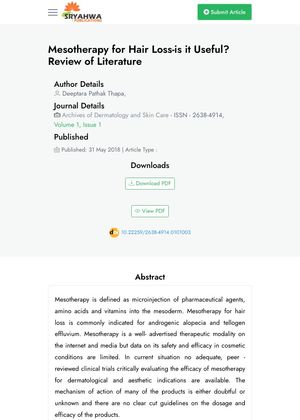TLDR Mesotherapy for hair loss lacks strong evidence and clear guidelines for its effectiveness and product use.
The document "Mesotherapy for Hair Loss-is it Useful? Review of Literature" from 2018 reviewed the use of mesotherapy, a process involving microinjections of pharmaceutical agents, amino acids, and vitamins into the mesoderm, for treating hair loss conditions like androgenic alopecia and tellogen effluvium. However, the review found that there was a lack of adequate, peer-reviewed clinical trials evaluating the efficacy of mesotherapy for dermatological and aesthetic indications. Furthermore, the mechanism of action of many of the products used in mesotherapy was either doubtful or unknown, and there were no clear guidelines on the dosage and efficacy of these products.
January 2015 in “Indo American Journal of Pharmaceutical Research” Mesotherapy uses small injections to improve skin, reduce fat, and treat hair loss effectively and quickly.
 April 2014 in “Journal of Aesthetic Nursing”
April 2014 in “Journal of Aesthetic Nursing” Mesotherapy with natural extracts and vitamins can improve hair loss and promote regrowth in most women.
 January 2014 in “Jaypee Brothers Medical Publishers (P) Ltd. eBooks”
January 2014 in “Jaypee Brothers Medical Publishers (P) Ltd. eBooks” Mesotherapy might help with hair and scalp problems.
 3 citations
,
April 2011 in “Expert Review of Dermatology”
3 citations
,
April 2011 in “Expert Review of Dermatology” Mesotherapy lacks strong evidence for effectiveness and safety, and its ingredients are not FDA-approved for subcutaneous use.
 1 citations
,
January 2011 in “The annals of clinical and analytical medicine”
1 citations
,
January 2011 in “The annals of clinical and analytical medicine” Hair mesotherapy showed improvement in hair growth and thickness without side effects.
 25 citations
,
January 2010 in “International Journal of Trichology”
25 citations
,
January 2010 in “International Journal of Trichology” Mesotherapy for hair loss lacks evidence of effectiveness and safety and should not be used without further scientific support.
June 2007 in “CRC Press eBooks” Aesthetic mesotherapy can improve the appearance of the face and hair.





